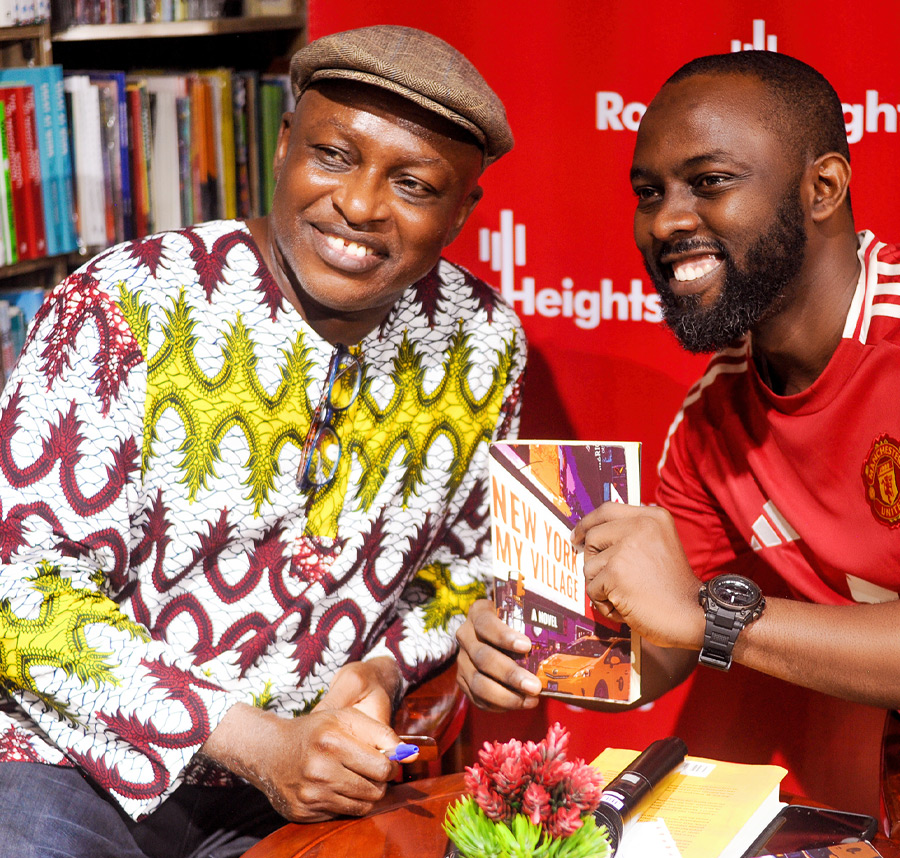… Uwem Akpan amplifies forgotten voices of the civil war in Lagos reading
- 26 July, 2025

In the first leg of his Nigerian book tour, Uwem Akpan, author of the critically acclaimed novel, New York, My Village, captivated an audience at Roving Heights Bookstore in Lagos with a powerful reading and conversation that revisited the harrowing experiences of Niger Delta minorities during the Nigerian Civil War
Although the book is set in present-day New York, its heart beats with the echoes of a war that deeply scarred Nigeria and left certain communities, especially minorities, marginalised and voiceless in the nation’s collective memory.
Last Saturday, Akpan was engaged in conversation by journalist, Ijeoma Ucheibe, who steered the discussion toward the war’s underexplored narratives. The author, originally from Akwa Ibom, used the moment to delve into the complexities and traumatic aftermath of the war as experienced by minorities in the Niger Delta. These communities, he said, were often caught in the deadly crossfire between the Federal and Biafran forces, suffering unspeakable atrocities and displacements. For Akpan, writing this story was not only a creative decision but a moral responsibility that took over a decade of research and soul-searching to fulfill.
“My mother always told me about Biafra,” Akpan began, drawing from childhood memories that planted the early seeds of curiosity. Born in 1971, a year after the war ended, he grew up in its shadow. He recounted how, during family meals, his relatives would always remark, “There’s so much food,” which later puzzled him until he understood they were comparing it to the hunger and starvation that claimed the lives of many, especially children, during the war.
One of his earliest personal encounters with the war’s lingering traces occurred at the age of six when he started primary school in a neighboring village. Behind the school was a mass grave of about 150 Biafran soldiers. “We used to wrestle there,” he recalled. “Your shirt or shorts would stick to something, and it would be a bone.” The site left an indelible mark on his memory. Among his peers, losing a wrestling match came with the insult, “You’re Biafran” a derogatory label that carried the weight of defeat and shame. Even as children, the trauma of war loomed heavily over their play.
Akpan noted that, unlike the Igbo, minority ethnic groups in the Niger Delta seldom talk about the war. He attributed this silence to the immense trauma and the sense of helplessness that came with being pawns in a larger conflict. “Minorities don’t talk about the war the way Igbo people do,” he told his listeners. “It’s a tragic episode we just want to forget.” He only began to understand the broader implications of the conflict when he joined the Society of Jesus in Benin City as a seminarian.
Living in a seminary with American priests, Akpan soon discovered that even among educated foreigners, the civil war narrative was largely told from the Igbo perspective. “To them, minorities didn’t even exist, so how could we have a viewpoint?” he said. This absence of recognition spurred his desire to tell the war’s forgotten stories, especially from the vantage point of communities rarely mentioned in historical accounts.
According to Akpan, the visibility of the Igbo in Nigerian and global discourse allowed their story to be told more widely. “The Igbo were lucky,” he said. “They were already a big ethnic group before the war. Chinua Achebe’s Things Fall Apart, written before the war, gave global prominence to the Igbo identity.” In contrast, many Niger Delta minorities could barely find their homelands on a map. Their struggle wasn’t just to survive the war but to have their suffering acknowledged at all.
That desire for representation became more urgent when, during his time at a leper colony in Benin in 1991, an elderly woman accused him of being a Biafran soldier who had raped her. Though he clarified his identity, the accusation opened a floodgate of buried stories. “That’s when I really started asking questions,” he said. As he probed further, he learned of widespread atrocities: Biafran forces had occupied Benin City for six weeks, raping women and killing civilians. In retaliation, the local youth formed a militia of 600 people to defend the city, but the group was infiltrated and slaughtered.
Akpan described how the retreating Biafran army used minority communities as human shields as they fled from Murtala Mohammed’s advancing Federal troops. “Hundreds of minorities were killed, and many drowned,” he said, his voice heavy with the weight of these hidden histories. “It’s a mountain just to exist as a minority,” he added. Writing their story, he believes, is a way to climb that mountain.
His novel joins a growing body of work by Nigerian writers seeking to reclaim the war’s lost voices. Alongside Chimamanda Ngozi Adichie’s Half of a Yellow Sun and Chigozie Obioma’s The Road to the Country, Akpan’s New York, My Village contributes to a vital literary reckoning. These books challenge the government’s long-standing silence on the war, which remains largely absent from school curricula and national dialogue.
For him, fiction is not just storytelling, it is an act of remembrance, resistance, and restoration. “Until we acknowledge all sides of the war,” he said, “we can’t truly heal.”
Source: The Sun
